
LGBT
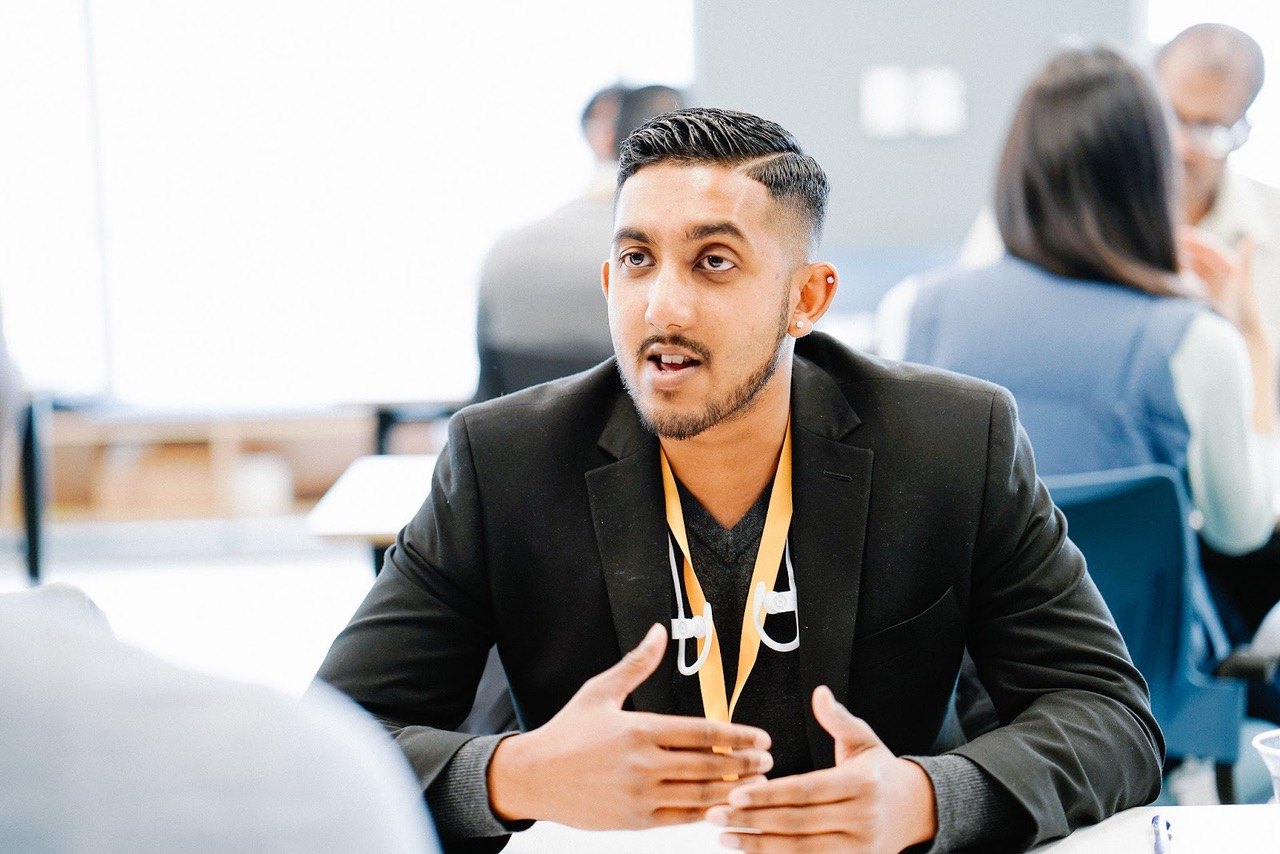
Kenyatta Leal is living proof that having a secure job after being incarcerated can be a defining lifeline. After serving 19 years in prison, he not only found employment for himself, but eventually led a nationwide effort in creating a pathway to earning a living wage for those who are justice impacted. Leal’s story is evidence of the importance of landing a secure job for those who are formerly incarcerated. According to a Brookings Institution report, those re-entering communities are less likely to commit a crime when they have reliable, full-time work. In the U.S., a country with the highest prison rate in the world, identifying proactive and effective ways to reintegrate the formerly incarcerated into society could be a pathway for profound socioeconomic change.
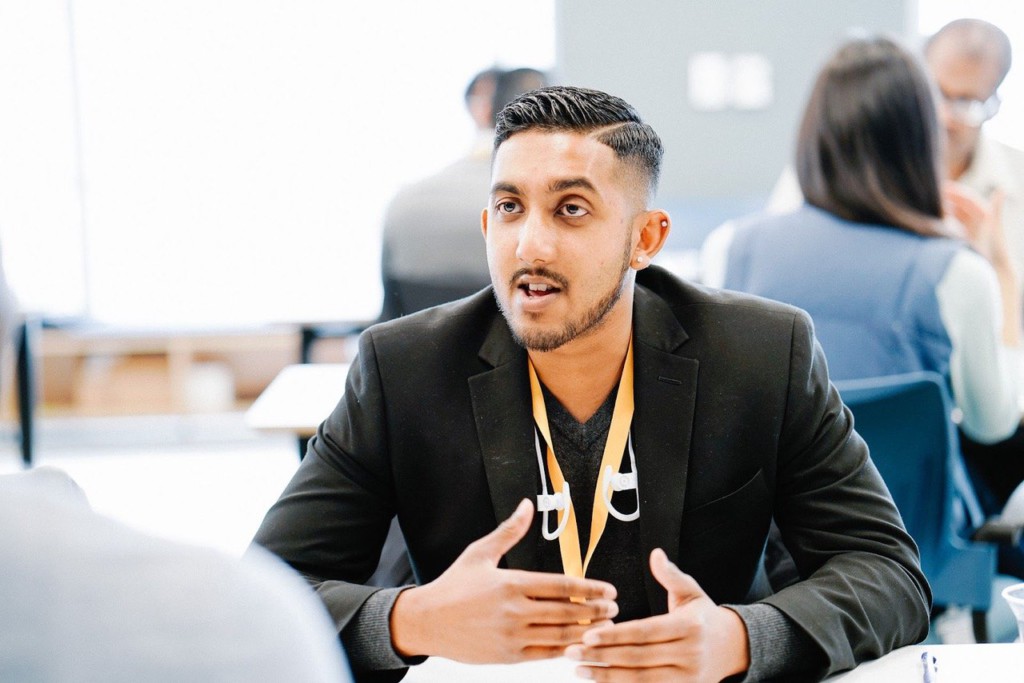
Participant of Next Chapter’s programming. (Photo © Next Chapter)
In this interview, we’ll hear from Leal, the Executive Director of Next Chapter, about his journey from a 19-year incarceration to working with tech companies like Slack, Zoom, and Dropbox to create pathways to high-skilled engineering jobs for formerly incarcerated people. Kenyatta speaks with Kate Dinota from Tides’ Corporate Social Impact team, about what he learned while he was in prison, the importance of destigmatizing justice-impacted people, and his vision for Next Chapter. Listen to the interview, or read the transcript below.
Welcome Kenyatta, it’s great to be with you today. To get us started, Kenyatta, could you tell us a little bit about yourself and your journey to this role at Next Chapter?
Absolutely. Thanks for having me again. As you mentioned, I’m Kenyatta Leal and I’m the executive director at Next Chapter. And I come into this work through my own incarceration. In 1994, I was sentenced to life in prison for a parole violation. I was 25 years old at the time, and then, as you might imagine, I was overwhelmed with the prospect of living the rest of my life in prison. I literally spent the next 19 years just learning how to survive the prison experience, but also, doing some deep reflection on my life. And really just how my actions impacted everyone around me. Not just myself, but my family and my community. And it just really made me think deeply about everything that I had done to get myself in prison. And deep down, I knew that I was a good person, I just wasn’t doing a very good job of showing it. And deep down inside, I also knew that I wasn’t in prison just to get out, you know? I knew I wanted to change. But as you might imagine, in prison there isn’t a manual on change that you can just go open up the book and learn how to change.
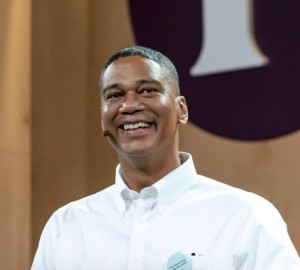
Kenyatta Leal, Executive Director of Next Chapter
This isn’t one of those things that you can just Google and just figure it out, right? I mean, it was a really tough situation. But, I ended up doing probably the most important thing that I could’ve done at that point in my life, and that was [to] just humble myself enough to ask for help. Help came from many different directions. And I found myself at a place called San Quentin, and they had a bunch of programs there. And from that point in my life, I really immersed myself in those programs.
It was the support network of those programs that really helped me navigate this kind of change that I was talking about. And it was that support and those programs that really helped me develop a mindset to not only just get out of prison, but to stay out. And I worked really, really hard to turn my life around, and in 2013, all the hard work paid off, because the same judge that sentenced me to life in prison overturned my sentence in 2013.
I was released with time served. Since my release in 2013, I’ve been working really diligently at this intersection of justice reform in tech. First as a founding member of The Last Mile, which is a software development training program that I helped start while I was serving my time at San Quentin. Upon my release, I became an evangelist and a re-entry manager and a board member of Last Mile and really worked hard to help them scale that program across 16 prisons in five different states, working with youth and incarcerated men and women as well.
It was during my time working there that I was introduced to this idea of Next Chapter and got introduced to what Slack was doing over there. And that’s when I began working on the Next Chapter initiative full-time. First as the re-entry manager, then I [was] promoted to the re-entry director, and now I’m the executive director. As the executive director, my role is to oversee the strategy and coordination of all aspects of the program and to manage the relationships with our corporate partners and our community partners and help with the programmatic efforts and whatnot. It’s a fantastic kind of dream job for somebody like myself, and I feel really blessed to be in this position.
Thank you for sharing your journey. Could you help me and the audience understand a bit more about the “why” behind Next Chapter? I know there [are] some 2.5 million people incarcerated in the U.S. The unemployment rate [for them] is five times that of the national average. Could you set the scene a little bit for us about what kind of challenges folks face when they come out of prison?
As you mentioned, those are some staggering statistics. Justice reform in America has never been more vital to our country’s health, or more urgent than it is today. We currently have 2.5 million Americans that are imprisoned in the United States, and 95% of those currently incarcerated are going to return back to our communities. So who do we want those people to be?
My friend Beverly Parenti over at the Last Mile says, “People are gonna come home, and who do you want them to be?” And so, we gotta think about that, because when formerly incarcerated people [are] released, they’re confronted by this really harsh and unforgiving kind of society and job market. As you mentioned, unemployment rates [for formerly incarcerated individuals] are five times higher than those faced by other job seekers. The research shows over and over again that lack of employment—lack of stable employment—drastically increases the likelihood that an individual will return back to jail or prison, or to recidivate. It makes joblessness a leading predictor of recidivism. This is a really counter-productive cycle.
It really is a vicious cycle of release, and “return back to prison.” It’s poverty. It hurts everybody, including the people who are caught in a cycle. Employers, and taxpayers—it impacts us all. And I think in large part, that the technology industry today has a powerful opportunity to break this cycle. The population of people who are re-entering [society after prison] consists of a lot of driven, energized, determined, and just really talented people desiring meaningful work.
I think they offer the tech sector a really robust employment pipeline. Some of the people in our program are some of the hardest working people that you’ll ever meet. An entire sector-wide investment in re-entering individuals would transform communities, support dedicated and resourceful individuals, [and] just really inspire hope in those looking to be more and to do more. When you think about this, this isn’t an issue that you can just throw money at. If you want to make a real impact on people’s lives who are leaving prison, then you have to create different opportunities. You have to create real pathways to jobs.
And that’s what we’re about with Next Chapter, is building a pathway to that.
I think that’s a great overview of the challenge, Kenyatta. The corporate tech sector has aimed to address this with different solutions, and one of the solutions is Next Chapter. Can you share a bit more about the program? Who does the program serve? What are the goals of the program? And how can it help us address this challenge of a lack of pathways?
Next Chapter is an eight-month apprenticeship program for system-impacted individuals who are pursuing a career in tech. We work with our community partners to source, vet, and select candidates for the program. The people who are selected for the program start with three months at Hack Reactor, which is our education partner. They’re a really great boot camp based in San Francisco. That bootcamp helps folks improve their coding skills and really helps them ramp up. Then they transition to one of our partner companies where they have five months to work with the engineering teams at their respective companies.
Another big lie that we subscribe to is that people that are system-impacted, their lived experience doesn’t have any value.
It’s an opportunity for them to really show what they can do. We’ve been successful there. We’ve placed our first 13 people who’ve graduated from our program [and they’ve been] converted into full-time engineers. So we’ve had a bit of success there. As successful as that’s been, our work doesn’t stop there. We work alongside our hiring partners to create a safe place within the companies for the employees to ask questions and get proximate to the issue of justice reform.
You know, a place where they can learn more about the systemic barriers that make finding employment so difficult for people leaving incarcerated settings. And it’s really through that work that we’re able to address the fear, get down to the fear that’s associated with system-impacted individuals and really start to shift perceptions around the potential of those people and what they can do when they come home. We talk about the big lie—everybody talks about the big lie. Another big lie that we subscribe to is that people that are system-impacted, their lived experience doesn’t have any value. And we believe different at Next Chapter. That’s what we’re trying to do with our program: really bring the humanity back to the equation.
I want to talk about how corporate philanthropy and corporate social impact has made this work possible. I know Slack was your first corporate partner. Since then, you’ve worked with Zoom and Dropbox. Can you share a bit about how those partnerships were born, and what the impact of the work has been so far?
Sure. Back in 2016, employees at Slack—including Stewart Butterfield, the CEO—all visited San Quentin State Prison. And there they were introduced to the Last Mile program. That’s the program that I helped start when I was in San Quentin. Let me tell you a little bit about Last Mile—they’re a non-profit that basically prepares people who are in prison for successful re-entry through technology training. Software development, to be more specific.
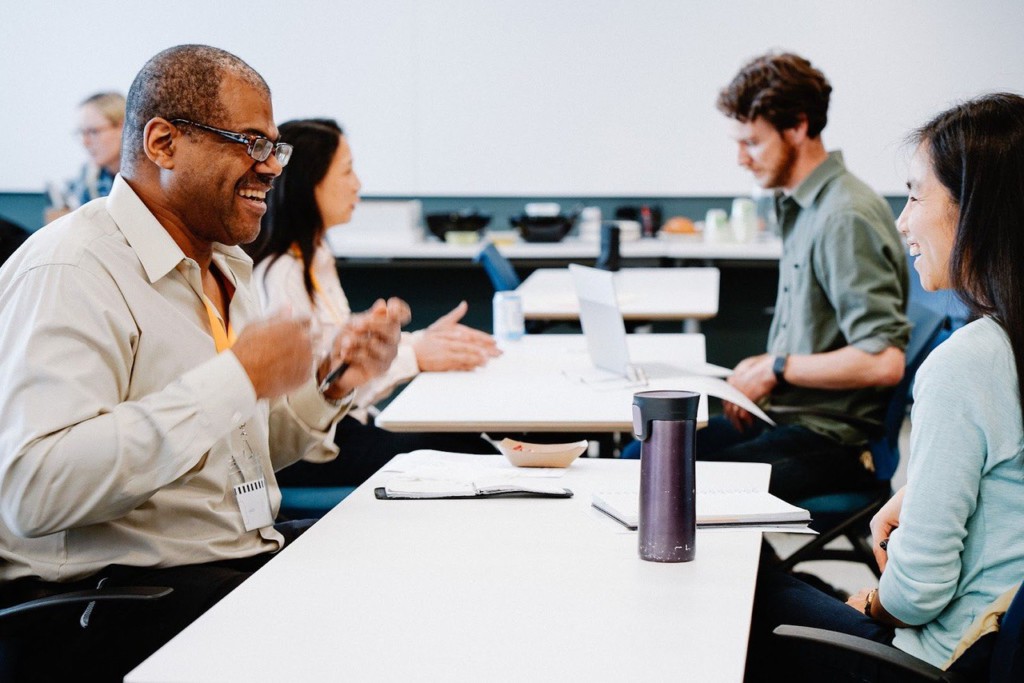
“We’ve gotten [feedback] from our partners that some of the engineers that work on their teams now are some of the best engineers that they have in their entire engineering team” (Photo © Next Chapter)
I think that their work, their efforts, the things that they’ve done—because we really haven’t done anything except advocate for them to have a fair opportunity—but they’ve actually come in and done the work. And I think that they’re now valuable members of their team at Slack, and they have these really unique experiences that they contribute to help build a more robust product and [an] even more inclusive environment and culture within the company.
And it’s that work that we really wanted to share and be able to grow the program. So we started reaching out to other companies and other relationships were built with Zoom and Dropbox. Right now we’re working with 11 different hiring partners, and so those conversations continue, and we continue to look for different avenues where we can build those relationships. And as I mentioned, the biggest hurdle that we have to overcome with our corporate partners is overcoming that fear and helping people see the value in the lived experience of the individuals. I’m really proud of these relationships and what we’ve been able to accomplish, but there’s so much more to do.
I know part of the work at Next Chapter is reducing the stigma and shifting perceptions around hiring formerly incarcerated folks. The work speaks for itself—the partners that you’ve worked with are thrilled and the graduates of the program are excited and they feel a loyalty to the company. But what is the process? How are you thinking about working with corporate partners to do some of this perception-shift?
Well, I think the most important thing is really helping get folks proximate to the issues to be able to create space within the companies to have these kinds of conversations. We are so much more than just putting butts in seats. Having 10, 15, 20, 30 cohorts—I mean, that’s great—but at the end of the day, our ultimate goal is to make fair chance hiring the norm. We actually want to work ourselves out of a job. That’s our goal.
We’re in a moment where a lot of corporations and corporate social impact teams are thinking about stepping into this space, and how they can move the needle on criminal justice reform. As someone with a lot of experience in this space—what kind of trends have you seen? Or, do you feel that this is a moment where people are able to really step up and make a change?
Yes. I think we are living in a really unique time right now. We’re at an inflection point in history—at least from my perspective. Ten years ago, I was sitting in prison with a life sentence. Today, I’m the executive director of an organization and a thought leader in a space that is really important. We’re addressing one of the most pressing issues of our time every single day. And I think corporate philanthropy and the role that it’s played in the development of Next Chapter is critical.

I haven’t been around corporate philanthropy very long, but in the short time that I have been, one of the things that I see is this investment in formerly incarcerated leadership. I think that there’s something to be said about leadership of organizations being closer to the actual issues. For issues like justice reform, it’s important to have people who are formerly incarcerated helping lead the efforts to change this trend that we see.
So many of us come from communities where we were once the problem, and now we are the solution. So for example, Aly Tamboura started at Chan Zuckerberg, is working on a different fund now where they’re funding programs across the country that are making an impact in justice reform. He’s a perfect example of great formerly incarcerated leadership, and what formerly incarcerated leadership can do when it comes to corporate philanthropy. That’s just one example, but I do think that’s a trend that I would love to see continue to grow.
I think that’s really powerful. Maybe you can speak a bit more about these types of partnerships with your corporate tech partners. What has that meant for individuals in the program? How has this impacted their lives? What changes have they been able to make in their lives and their communities as a result of this type of work?
I think whenever you can invest in the skills of people and the potential of people who were formerly incarcerated and system-impacted and work with employers to shift how they work to be more equitable and to be more welcoming—[these] are keys to this work. It’s this combination of individual investment in the people and partnership with leaders in the tech sector that creates this environment for systemic change. This is what we need to move forward.
We’ve had a number of people who’ve come through our program—a number of them I know personally—I’ve watched them go from earning pennies on a dollar in menial labor jobs, pushing brooms inside prison, and coming from generational cycles of poverty and incarceration in their own families. I’ve watched men and women through this program be able to break those cycles of generational poverty—break those cycles of generational incarceration—and really put themselves in a position where they could create generational wealth for their families. This is super impactful work, and that’s just one of the things that I see happening. On a lot of levels, this is really impactful both for the employers and the individuals.
That’s so powerful, Kenyatta. I so appreciate the time I get to spend with you guys and work with you, because it really is impactful work. A couple more questions here before we wrap up. One is, how do you reach your impact goals, and how does Next Chapter measure success?
Anecdotally, we’ve gotten [feedback] from our partners that some of the engineers that work on their teams now are some of the best engineers that they have in their entire engineering team. The success rate is like 3% with Hack Reactor—our people are at the top of those classes. I think that the fact that we have placed 13 people and had zero failures—these are things that anecdotally make all the impact in the world. I mean, the success speaks for itself.
It really is a testament to the individuals who are coming through our program. When you think about the systemic barriers that block an individual, think about this: transitioning, navigating your way through a prison environment—with all the chaos and uncertainty. Then going back to a community that doesn’t really value your lived experience. Every job you go to, you get turned down. Having to navigate your way through all of that, through post-incarceration education, to find an opportunity like Next Chapter, to actually make it through a program as rigorous as Hack Reactor. These companies are getting some of the most dedicated, committed, and talented people that they could ever recruit out of any pipeline, regardless of where they come from. We’re barely scratching the surface of what we can do. We need to create more opportunities, continue to support programs like Next Chapter, like the Last Mile, like Anti-Recidivism Coalition. [There are] so many organizations out there that are doing great work with folks that are coming home.
One last thing that I would just add is that we all have a role to play in this. We really do. Tides has a role to play, Next Chapter has a role to play. Each and every one of the people that are listening to this out there have a role to play in the kind of world that people coming home from prison are coming back to.
If we could overcome this fear as individuals and really see impacted individuals and their lived experiences as valuable, then we can bring around the kind of changes that I think that we want to see. But it starts with us as individuals. We can all make a difference.
What can other corporations do to support this mission? How can they get involved?
I have to use Slack as a perfect example because this wasn’t a PR move for Slack—they had skin in the game. They made true and durable commitments to this program, and they took real risks and invested in the growth and the well-being of the apprentices in powerful ways. Corporations—they need to understand that this isn’t an issue that you can just throw money at. If you want to make real impact on people’s lives who are leaving prison, you have to work really hard and create different opportunities. And as I mentioned, we all have a role to play in that. Creating those real pathways to jobs, that’s where it’s at for [corporations].
How about us as employees or individuals just out there in the world? Do you have a call to action for each of us? How can we support this kind of work and just generally help folks who are getting back on their feet?
Yeah. I think—and I know I sound like a broken record now—but all of us have a role to play. And I think each of us needs to stop and look in the mirror and think about how we contribute to this cycle of fear that perpetuates all these stigmas and stereotypes about system-impacted individuals. These stigmas and stereotypes, they’re a big part of the systemic barriers that have created this inequity, and I think just straight up discrimination in our hiring practices today. And if we could overcome this fear as individuals and really see impacted individuals and their lived experiences as valuable, then we can bring around the kind of changes that I think that we want to see. But it starts with us as individuals. We can all make a difference.

LGBT
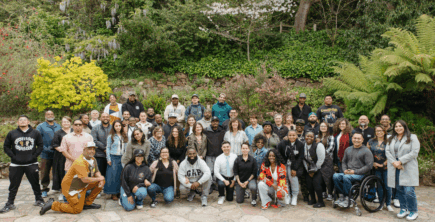
Corporate Partners

Philanthropy

Read the stories and hear the voices of social change leaders fighting for justice.